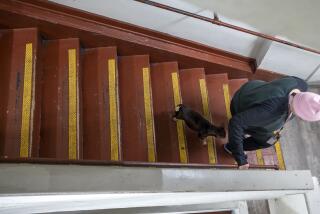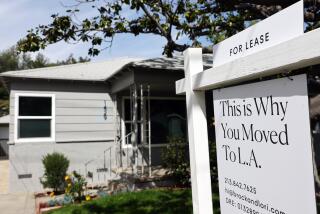A Match for Life : Group Helps Pair HIV-Positive Roommates
- Share via
ATLANTA — James Price wanted a roommate. Mark Germain needed a place to live.
Both valued their privacy. Each had a cat. Price and Germain had something else in common--HIV, the virus that causes AIDS.
They are among 150 people in Atlanta who have been matched as roommates through a government-funded shared-housing program for people with HIV or AIDS.
“This allows people who are independent enough to live in a safe, stable environment, so they don’t have to be institutionalized prematurely,” said Rita Zadoff, director of the nonprofit roommate-matching program Home But Not Alone. It is believed to be the only such program in the nation, according to the National Shared Housing Research Center.
Germain shared Price’s three-story townhouse in suburban Decatur for more than a year. He died in June.
“You try real hard not to get too attached,” Price said. “After he died, I thought I would take a break from it. I wasn’t sure I wanted to have any more roommates. Let’s face it--I’m looking at my own mortality.”
Nationwide, the need for affordable housing for people with AIDS is on the rise, because more people are contracting the disease, medication is getting more expensive, and people are living longer, said Gerry Ansel, a spokesman with AIDS Project Los Angeles.
The federal Centers for Disease Control and Prevention estimates that between 650,000 and 900,000 people were living with HIV in 1995. The average lifetime cost of medical care after the disease is diagnosed is $119,000, the CDC said.
Many communities are seeking ways to expand housing for people with AIDS beyond hospices and hospitals, which are costly and available only to those in the final stages.
The U.S. Department of Housing and Urban Development has created a division--Housing Opportunities for People With AIDS--to funnel money to such housing programs.
The Atlanta Jewish Community Center sponsors Home But Not Alone, which receives about $45,000 a year in combined funding from HUD, the city of Atlanta, the United Way and several AIDS organizations.
The 2-year-old program is a spinoff of HOUSEMATES, a national home-sharing program that matches the elderly with younger roommates.
At least one person in the match must be HIV-positive. A doctor must verify that the applicant has HIV, Zadoff said.
“We have a very private office. All our cabinets are locked. When we do reference checks, we never discuss the person’s health,” she said. “We sit down and kind of counsel them. We tell them this is an option that’s cost-effective. If they’re not ready or don’t feel comfortable, we don’t push them.”
Several people who are not HIV-positive have taken roommates, but almost all want to be matched with someone who also has the AIDS virus, Zadoff said. There are few women and no children in the program.
“There’s comfort there--knowing you’re sharing the same frightening situation,” said Price, who was diagnosed with the AIDS virus in 1987. “You want to live with someone who knows the score.”
Rent typically runs between $350 and $500 a month, Zadoff said.
Price, 49, has been living on disability checks and a modest retirement fund for more than five years. He used to advertise for roommates before he heard of Home But Not Alone.
“One of the first things I would tell them is that I was HIV-positive and ask them if that was going to be a problem. Most of the time, I never heard from them again,” he said.
The former insurance claims adjuster said the rent he collects goes toward his mortgage payment and upkeep of the house.
More to Read
Sign up for Essential California
The most important California stories and recommendations in your inbox every morning.
You may occasionally receive promotional content from the Los Angeles Times.










